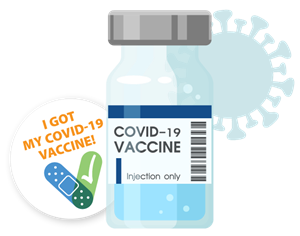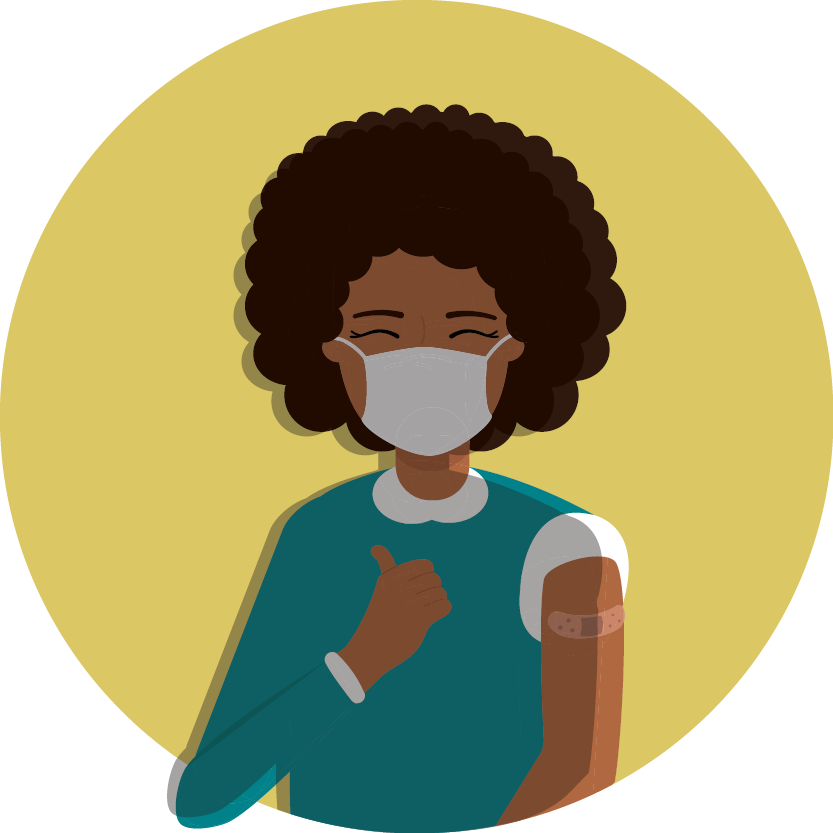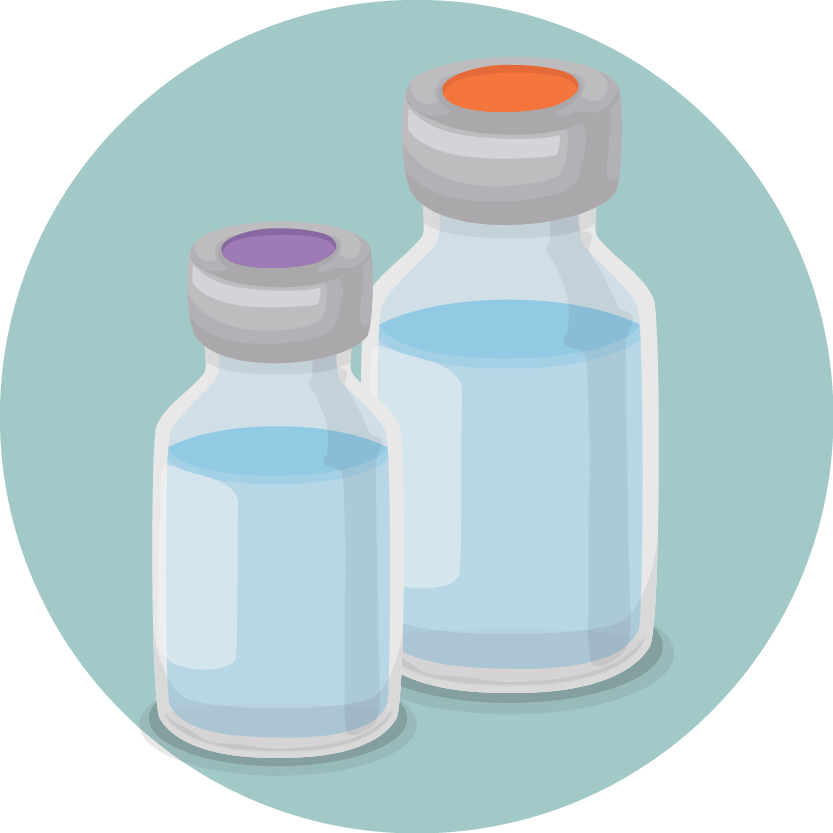 |
|---|
หน้าหลัก | สุขภาพดี | สุภาพสตรี | การแปลผลเลือด | โรคต่างๆ | วัคซีน
Different COVID-19 Vaccines
CDC has received increased reports of myocarditis and pericarditis in adolescents and young adults after COVID-19 vaccination. The known and potential benefits of COVID-19 vaccination outweigh the known and potential risks, including the possible risk of myocarditis or pericarditis. We continue to recommend COVID-19 vaccination for anyone 12 years of age and older.
Authorized and Recommended Vaccines
Currently, three vaccines are authorized and recommended in the United States to prevent COVID-19:

Different COVID-19 Vaccines
The best COVID-19 vaccine is the first one that is available to you. Do not wait for a specific brand. All currently authorized and recommended COVID-19 vaccines:
CDC does not recommend one vaccine over another.
Vaccine Brand Name
Who Can Get this Vaccine [ 1 ]
How Many Shots You Will Need
When Are You Fully Vaccinated?
People 12 years and older
2 shots
Given 3 weeks (21 days) apart [ 2 ]
2 weeks after your second shot
People 18 years and older
2 shots
Given 4 weeks (28 days) apart [ 2 ]
2 weeks after your second shot
1 If you have had a severe allergic reaction (anaphylaxis) or an immediate allergic reaction to any ingredient in the vaccine you are scheduled to receive, you should not get that vaccine. If you have been instructed not to get one type of COVID-19 vaccine, you may still be able to get another type. Learn more information for people with allergies.
2 You should get your second shot as close to the recommended 3-week or 4-week interval as possible. However, your second shot may be given up to 6 weeks (42 days) after the first dose, if necessary.
Vaccine Types
Vaccines in Phase 3 Clinical Trials
As of February 27, 2021, large-scale (Phase 3) clinical trials are in progress or being planned for two COVID-19 vaccines in the United States:
Learn more about U.S. COVID-19 vaccine clinical trials, including vaccines in earlier stages of development, by visiting clinicaltrials.govexternal icon.
This page will be updated as additional information is available.
For Healthcare Professionals
Understanding How COVID-19 Vaccines Work
What You Need to Know

The Immune System—the Body’s Defense Against Infection
ก่อนที่จะเรียนรู้เรื่องโควิดวัคซีนเราจะต้องเรียนรู้กลไกของร่างกายที่จะต่อสู้กับเชื้อโรค เช่นไวรัสที่ก่อให้เกิดโรคโควิด เมื่อไวรัสโควิดเข้าสู่ร่างกายจะทำให้เกิดการแบ่งตัวของไวรัสเราจะเรียกว่าการติดเชื้อ ซึ่งทำให้เกิดโรค ระบบคุ้มกันของร่างกายจะมีกลไกหลายชนิดในการต่อสู้กับเชื้อโรค ระบบเลือดของเราจะมเม็ด่เลือดแดงซึ่งจะพาออกซิเจนไปสู่เนื้อเยื่อ และมีเม็ดเลือดขาวหรือภูมิคุ้มกันซึ่งจะต่อสู้กับเชื้อโรค เม็ดเลือดขาวมีหลายชนิดทำหน้าที่ต่างๆกันเพื่อต่อสู้กับเชื้อโรค
เมื่อคนเราติดเชื้อโควิดครั้งแรกจะใช้เวลาหลายวันถึงสัปดาห์ที่จะให้ร่างกายใช้เม็ดเลือดขาว ระบบภูมคุ้มกันิเพื่อฆ่าเชื้อโรค หลังจากเชื้อโรคหายระบบภูมิคุ้มกันของเราจะมี บีลิมโฟไซท์ ซึ่งพร้อมที่จะสร้างแอนตี้บอดีเมื่อเจอเชื้อโรคเดิม และทีลิมโฟไซท์ ที่จะทำลายเซลล์ที่ติดเชื้อโรค เมื่อเราหายจากโรคจะเหลือ ทีลิมโฟไซท์ จำนวนหนึ่งที่เรียกว่า memory cell เมื่อร่างกายได้รับเชื้อไวรัสตัวเก่าเข้ามาตัวเมมโมรี่เซลล์จะเช่าไปทำลายเชื้อโรค บีลิมโฟไซท์ก็จะสร้างภูมิคุ้มกันที่จะต่อสู้กับเชื้อโรค ผู้เชี่ยวชาญกำลังศึกษาว่า memory เซลล์นี้จะอยู่ได้นานแค่ไหน
หลักการทำงานของวัคซีน
How COVID-19 Vaccines Work
COVID-19 vaccines help our bodies develop immunity to the virus that causes COVID-19 without us having to get the illness.

Different types of vaccines work in different ways to offer protection. But with all types of vaccines, the body is left with a supply of “memory” T-lymphocytes as well as B-lymphocytes that will remember how to fight that virus in the future.
It typically takes a few weeks after vaccination for the body to produce T-lymphocytes and B-lymphocytes. Therefore, it is possible that a person could be infected with the virus that causes COVID-19 just before or just after vaccination and then get sick because the vaccine did not have enough time to provide protection.
Sometimes after vaccination, the process of building immunity can cause symptoms, such as fever. These symptoms are normal and are signs that the body is building immunity.
Learn more about getting your vaccine.
Types of Vaccines
Currently, there are three main types of COVID-19 vaccines that are authorized and recommended or undergoing large-scale (Phase 3) clinical trials in the United States.
Below is a description of how each type of vaccine prompts our bodies to recognize and protect us from the virus that causes COVID-19. None of these vaccines can give you COVID-19.
Some COVID-19 Vaccines Require More Than One Shot

To be fully vaccinated, you will need two shots of some COVID-19 vaccines.
If it has been less than two weeks since your shot, or if you still need to get your second shot, you are NOT fully protected. Keep taking steps to protect yourself and others until you are fully vaccinated (two weeks after your final shot).
Learn how to find a COVID-19 vaccine so you can get it as soon as you can.
